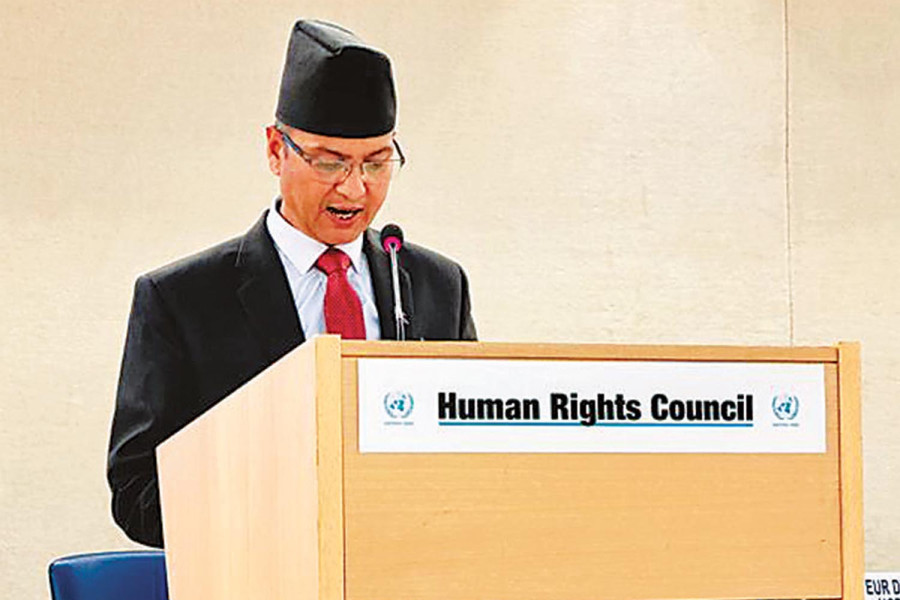Editorial
Lies going global
Govinda Bandi’s representation at the Human Rights Council signals Nepal’s failure on transitional justice.
Nepal this week completed its annual pilgrimage to Geneva, reiterating its stale commitment to provide justice to the victims of the insurgency-era crimes after amending the Enforced Disappearances Enquiry, Truth and Reconciliation Commission Act. That the global human rights community has learnt to take the Nepali state's commitment to justice in insurgency-era atrocities with a pinch of salt is well-known. To top it all, the government this time got a commoner to lead the Nepali delegation as Prime Minister Pushpa Kamal Dahal’s adviser. Bandi was perhaps unaware of his rise in status before the prime minister decided to use him to replace the then Foreign Minister Bimala Rai Paudyal as the head of the Nepali delegation.
In keeping Paudyal grounded and sending Bandi to Geneva at the last hour, Prime Minister Dahal managed not only to display his penchant for vindictive politics at home but also lack of commitment to human rights on the global stage. Perhaps Dahal was too wary of a woman minister, who would be leaving the government soon anyway and one who could make progressive commitments on improving the human rights situation back home. So he needed one of his henchmen who would blindly follow his words rather than look up international guidelines on human rights and transitional justice.
Beyond the delegation’s questionable representation, though, the looming question is that of transitional justice itself, on which Bandi spoke eloquently at the 52nd session of the UN Human Rights Council. “Nepal is close to concluding the peace process by establishing a credible, meaningful and victim-centred transitional justice process,” Bandi told global leaders concerned about Nepal’s human rights situation. “My delegation assures that there will be no amnesty for serious human rights violations.”
Only if this were true. Bandi is the same man who introduced a bill to amend the Act in Parliament in July last year when he was the Minister of Law and had to backtrack after public outcry, mostly from victims and their families, concerning a clause on the provision of mass amnesty in grave human rights violation cases. The same man who lost moral authority among the victims back home during his tenure as law minister was now waxing eloquent on the Nepali state’s commitment to justice while his own status is questioned at home. Moreover, no matter what promises the Nepali state makes in international forums, it has yet to assure the victims of its commitment to justice in cases of gross rights violations.
The bill Bandi proposed last year clearly showed his inclination to mass amnesty as only “cruel murders” would be beyond the purview of amnesty. No wonder Dahal, who has no intention of taking the transitional justice process to a logical conclusion, chose a man of his inclination to represent the state at the global human rights forum. A commitment in front of international human rights defenders is not enough; the government should work sincerely to conclude the justice process by taking into confidence all its stakeholders. And, should anyone have any doubt, it is the victims and not the perpetrators who make the call on what crimes, if any, qualify for amnesty.




 8.43°C Kathmandu
8.43°C Kathmandu














